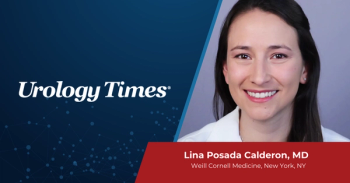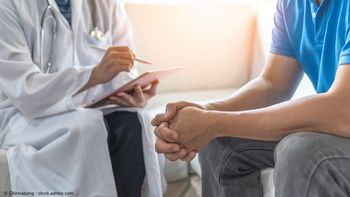
Dr. Giri and Dr. Loeb discuss prostate cancer genetic testing podcast series

“We need to leverage these great platforms to put out high-quality information with experts that people can listen to from home or on the go and get the information that they need,” says Stacy Loeb, MD, MSc.
In this video, Stacy Loeb, MD, MSc, and Veda Giri, MD, discuss the findings of the paper, “Usefulness of podcasts to provide public education on prostate cancer genetics,” which was published in Prostate Cancer and Prostatic Diseases (
Giri is division chief of Clinical Cancer Genetics for Yale Cancer Center and Smilow Cancer and assistant director of Clinical Cancer Genetics for Yale Cancer Center, New Haven, Connecticut. Loeb is a professor in the departments of urology and population health at the NYU Grossman School of Medicine, New York City, New York.
Transcription:
Is there anything you would like to add?
Giri: This whole endeavor has been so fruitful from our end. We really learned a lot by having these in-depth discussions with health care providers, patients with a family member, and genetic counselors. It really highlights the importance of these types of team-based approaches, with doctors, with genetic counselors, with patients, to approach this field. It takes all of us to think about ways of disseminating this information, whether it's in our networks, in our communities, and expanding upon the use of technology to be able to disseminate this information. We're really grateful for funding from the Department of Defense for an idea development award that funded this project, and to be able to use technology to disseminate this information. We wouldn't be able to do it without the funding, and, of course, then collaboration with experts like Dr. Loeb, and other individuals who took part in the podcast, so we'd really like to thank everyone who agreed to be interviewed for the podcast. We hope to do more.
Loeb: I agree. I think it's very topical, especially in the current climate with so much misinformation that's circulating and the difficulty that patients and family members have finding high-quality sources of information. Things like podcasts and social media are so ubiquitous, and so we need to leverage these great platforms to put out high-quality information with experts that people can listen to from home or on the go and get the information that they need. It's exciting to see the study results that the podcasts were really well received and that people really learned a lot about genetics from them. I hope that in the future that more health care providers and scientists will use these great platforms toshare more evidence-based information with the public
This transcription was edited for clarity.
Newsletter
Stay current with the latest urology news and practice-changing insights — sign up now for the essential updates every urologist needs.





